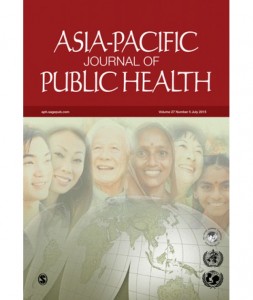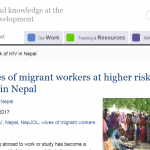Approximately 3.5 million young Nepalese are working abroad. Unskilled construction jobs including labourer, scaffolder, plumber and carpenter are the most common jobs. Every year there are more than 1000 de aths and many hundreds cases of injuries among Nepalese workers in these countries excluding India. For example, the Foreign Employment Promotion Board of Nepal recently reported that 1002 Nepalese migrant workers died in the 6 GCC countries and Malaysia in the last Nepalese calendar year, of which 357 (36%) were documented as cardiac related. However, in a quarter of deaths, the cause was unknown. Postmortem examination of migrant workers in many destination countries is not carried out and official records of the destination countries tend to record these deaths as being ‘from natural causes’. Information on underlying causes, such as heat stress on construction sites, is often not available.
aths and many hundreds cases of injuries among Nepalese workers in these countries excluding India. For example, the Foreign Employment Promotion Board of Nepal recently reported that 1002 Nepalese migrant workers died in the 6 GCC countries and Malaysia in the last Nepalese calendar year, of which 357 (36%) were documented as cardiac related. However, in a quarter of deaths, the cause was unknown. Postmortem examination of migrant workers in many destination countries is not carried out and official records of the destination countries tend to record these deaths as being ‘from natural causes’. Information on underlying causes, such as heat stress on construction sites, is often not available.
The paper [1] which was recently published in SAGE’s Asia Pacific Journal of Public Health Journal, is jointly contributed by researchers based in New Zealand, Nepal, and FHSS’s Professor Edwin van Teijlingen and Post Doctoral Research Fellow, Dr Pramod Regmi, Dr Pratik Adhikary (BU’s ex PhD student) and FHSS’s visiting Professor Padam Simkhada. The authors argue that despite the contribution made by migrant workers to the economic prosperity of the host countries, they often face many major difficulties accessing effective health care and are perceived as a burden on the local health care system. Therefore, greater efforts are needed to protect the health and well-being of migrant workers from Nepal and other South-Asian nations.
BU staffs and students can freely access this paper by visiting this link.
- Aryal, N., Regmi, P., van Teijlingen, E., Simkhada, P., Adhikary, P., Bhatta, Y. and Mann, S., 2016. Injury and Mortality in Young Nepalese Migrant Workers: A Call for Public Health Action. Asia Pacific Journal of Public Health. DOI: 10.1177/1010539516668628
Congratulations to the all authors for bringing up this important public health issue.
Pramod Regmi
 Nepali migrant workers in India #GlobalFoL17 presentation in Delhi
Nepali migrant workers in India #GlobalFoL17 presentation in Delhi New FHSS paper on migration research
New FHSS paper on migration research Press release INASP highlights BU research paper
Press release INASP highlights BU research paper Worldwide media coverage BU co-authored paper
Worldwide media coverage BU co-authored paper










 SPROUT: From Sustainable Research to Sustainable Research Lives
SPROUT: From Sustainable Research to Sustainable Research Lives BRIAN upgrade and new look
BRIAN upgrade and new look Seeing the fruits of your labour in Bangladesh
Seeing the fruits of your labour in Bangladesh Exploring Embodied Research: Body Map Storytelling Workshop & Research Seminar
Exploring Embodied Research: Body Map Storytelling Workshop & Research Seminar Marking a Milestone: The Swash Channel Wreck Book Launch
Marking a Milestone: The Swash Channel Wreck Book Launch ECR Funding Open Call: Research Culture & Community Grant – Application Deadline Friday 12 December
ECR Funding Open Call: Research Culture & Community Grant – Application Deadline Friday 12 December MSCA Postdoctoral Fellowships 2025 Call
MSCA Postdoctoral Fellowships 2025 Call ERC Advanced Grant 2025 Webinar
ERC Advanced Grant 2025 Webinar Update on UKRO services
Update on UKRO services European research project exploring use of ‘virtual twins’ to better manage metabolic associated fatty liver disease
European research project exploring use of ‘virtual twins’ to better manage metabolic associated fatty liver disease